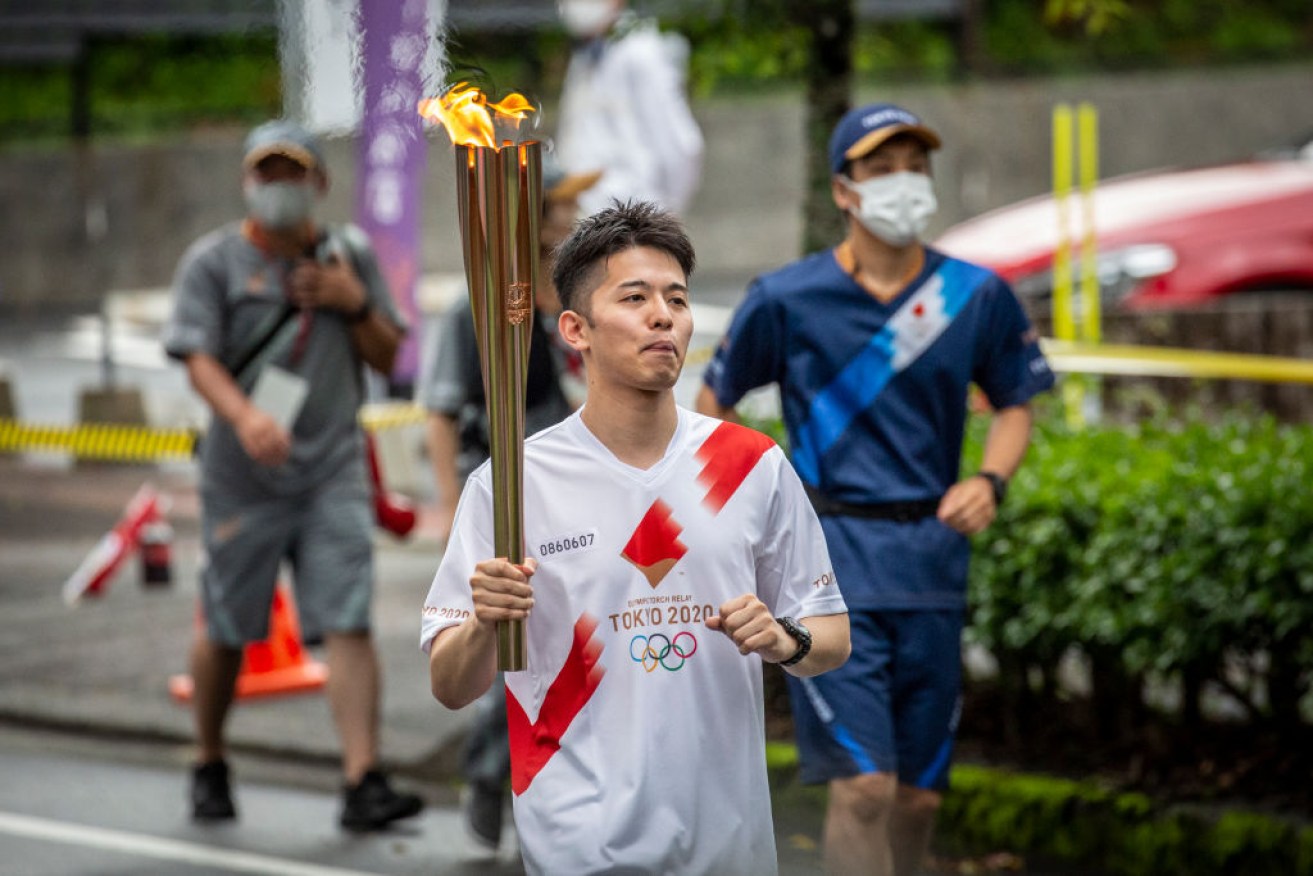Tokyo Olympic Games: Condoms, crowds and COVID concerns


As the Olympic torch relay makes its way around Japan, much of the original route has been changed to avoid large gatherings. Photo: Getty
Free condoms for athletes, thousands of silent spectators, and athletes flying into a country known for its ageing population and notoriously slow vaccination rate.
This is a snapshot of what’s to come at the Tokyo Olympic Games – and an example of the concerns about mixed messaging and COVID safety measures.
The rescheduled 2020 Summer Olympic Games are due to run from July 23 to August 8, while the Paralympic Games will run from August 24 to September 5.
Concerns for Tokyo Olympic Games
Although it’s great news for athletes who have trained their whole lives to compete, it’s a different story for Japanese locals.
More than 80 per cent of Japanese oppose hosting the events amid the COVID pandemic, according to a poll.

Protests have continued in Japan against the Tokyo Olympic Games. Photo: Getty
Adding to concerns is Japan’s slow vaccination rollout.
Similar to Australia, only 25 per cent of Japan’s population have received at least one dose of a COVID vaccine, according to Our World in Data,
That’s well behind comparable countries like the United Kingdom, which has administered at least one jab to 66 per cent of its population.
But despite fears of a COVID outbreak, the event appears to be going ahead.
It comes after years of planning, with the International Olympic Committee and the Tokyo organising committee desperate to hold on to billions of television money they would lose if the Games were cancelled.
So the Games are on. Here’s what they’ll look like.
Strict rules for athletes
Athletes with dreams of laughing and drinking with competitors from around the world will be sorely disappointed this year.
Upon arrival in Tokyo, they will receive a welcome package containing a 60-page playbook outlining the rules on their behaviour during the Games.
Punishments for COVID breaches – such as talking to drivers in official vehicles – include hefty fines, disqualification, loss of their medals or deportation.
All athletes must undergo a three-day quarantine period and will be required to get tested daily.
Face masks will be mandatory at all times, except when eating, sleeping, competing or outdoors.
They must stay in a bubble within the athletes’ village, where they are banned from socialising and sharing meals, but are allowed to drink alcohol in their rooms.
Everyone must depart Japan and say ‘sayonara’ within 48 hours of their final event.
OK, what’s all this about free condoms?
Since the 1988 Seoul Olympic Games, hundreds of thousands of free condoms have been distributed at the Games to encourage safe sex among mingling athletes staying in close quarters.
It was also a chance for condom makers to showcase their products.
This year, Tokyo Olympics organisers had planned to give away about 160,000 condoms to competing athletes in the village.
This was despite strong COVID safety advice that athletes “avoid unnecessary forms of physical contact”.
Facing criticism over the mixed messaging, Tokyo Games organisers have backflipped and said the condoms were not intended to be used in the athletes’ village.
They said the condoms were originally intended to raise awareness of HIV and AIDS, and must be kept under wraps and used at home.
Spectators
International spectators are banned from attending the Tokyo Olympics.
Japanese fans can attend, though numbers will be capped at 10,000.
The mood inside is all but guaranteed to be awkward.
Spectators are not allowed to show their support by chanting or singing – only by clapping their hands.
About 11,500 athletes are expected to travel to Japan to compete in the Games, in addition to an estimated 79,000 journalists, officials and staff who will also be in attendance.
Authorities are regularly reviewing the rules about what athletes and officials can and can’t do at the Games to limit the spread of COVID-19.
Time will tell if it’s enough.








